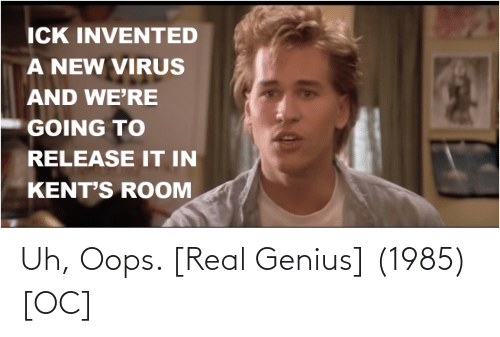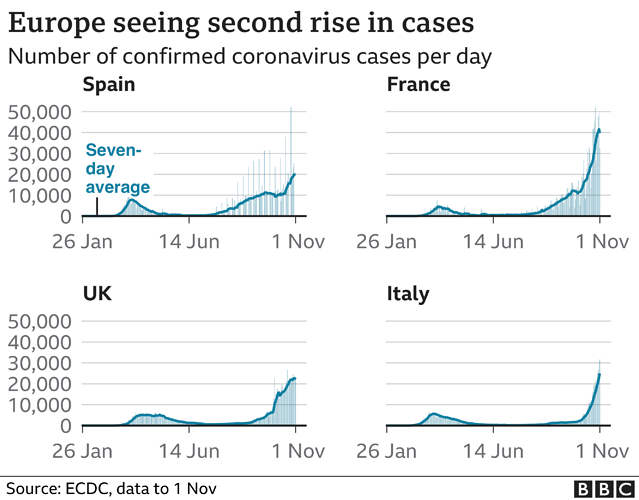It depends on the dynamic. If you want to test everyone everywhere, it would be a bummer to get turned away from the grocery store 1/6th of the time. I guess it also depends on whether there are people who just cough COVIDy all the time or what.
Deeply skeptical about that study and even more so about it being useful practically, but can’t put my finger on exactly why.
I guess it’s also possible (maybe even likely?) that it just functions as a generic early-stage respiratory virus detector, which would make the false positive rate not bad at all.
EDIT: that explanation makes it seem a bit less magical too. It makes total sense that faking a cough would produce detectable signs of a lung infection. It’s certainly less weird than coughing into someone who’s cupping your balls as a hernia detection mechanism.
It’s just amazing to me that somehow Boris Johnson is the voice of reason at this point.
How much of that was him being scared straight from his Covid-19 experience? It seemed like he was pretty shook by being hospitalized.
In his Commons statement, Mr Johnson said there was “no alternative” but to introduce national restrictions in light of the latest coronavirus data.
He said: “Faced with these latest figures, there is no alternative but to take further action at a national level.”
He insisted it was “right to try every possible option” before imposing a nationwide lockdown, and rejected criticism that the UK had been slower to act that other countries in Europe.
Well yeah. Guy nearly died.
Why not just test Saturday so you get the results before the game?
We love finding stupid ways to help the virus spread
Cellular (T-cell) immunity against the virus that causes Covid-19 is likely to be present within most adults six months after primary infection, with levels considerably higher in patients with symptoms, a study suggests.
The data offers another piece of the puzzle that could be key to understanding whether previous Sars-CoV-2 infections – the virus behind Covid-19 – can prevent reinfection, and if so, for how long.
The study, led by the UK coronavirus immunology consortium, evaluated 100 non-hospitalised healthcare workers in March and April after antibody responses were detected in them. It is yet to be peer-reviewed.
It is the first study to offer data on T-cell levels six months after infection in people with mild or asymptomatic disease that is likely to represent the majority of infections, the authors say.
The results of the study are likely to be viewed positively, after previous studies suggested antibody levels can decline within the first few months post-infection.
Data released from a 100,000-person sample in August indicated about 6% of the population of England had antibodies – proteins produced in response to an infection – but antibody levels dropped by more than a quarter in three months, researchers revealed in late October.
Once the virus enters the body, it is greeted by a cavalry of cells that mount a counterattack that is swift, broad and generic. This so-called innate immune system is meant to arrest the infection in its tracks. If that mission is foiled, it buys time until the “experts” show up.
These experts constitute two types of white blood cells: B-cells and T-cells, that work like brothers-in-arms. If the virus makes it past the initial assault, some T-cells are slayers, annihilating respiratory cells the pathogen has colonised.
Meanwhile, helper T-cells take on a supportive role – including stimulating B-cells to produce molecules called antibodies that render the virus immobile or thwart it from penetrating other cells. The adaptive system also retains memory – but in the case of Covid-19, it is unclear how much and for how long.
After being tracked for six months, researchers found that every person had detectable T-cell levels, and levels were 50% higher in people who had experienced symptoms at the time of infection.
This could mean that either there will be more protection in people with more severe initial disease, or conversely, that people with asymptomatic disease are able to control the virus with lower levels of T-cells, they said.
A bigger set of patients would be tracked for a longer time period to a get a better sense of cellular immunity, given that T-cells could survive for long periods, said one of the study’s authors, Paul Moss, a professor at the University of Birmingham.
The authors also saw that T-cells levels were strongly correlated with the peak level of the antibody response. Cellular immune responses could even help to protect against the decline in antibody levels over time, they added.
Overall, the results offer evidence that T-cell immunity may last longer than antibodies – but whether these persistent T-cells offer protection against reinfection remains unclear.
“I think this data is reassuring, potentially even encouraging — but it does not mean that people cannot get reinfected,” Moss said. “We now need large-scale population studies to show how the antibody and cellular profiles act together to protect people over time.”
In the study, some people lost detectable levels of antibodies. But that did not mean that B-cells, which make antibodies, were not around to spring into action if challenged again, the authors explained.
Ideally, testing for B-cells and T-cells in the community would provide a conclusive idea of how much the antibody response was actually predicting large-scale immunity, and whether there were people who did not have antibodies but were protected by cellular immunity, cautioned the author Shamez Ladhani, a consultant epidemiologist for Public Health England.
“But at the moment, there is little evidence to suggest that there is widespread cell-mediated immunity without an antibody response.”
Paul Morgan, a professor at Cardiff University, who was not involved in the study, said: “The work provides a welcome dose of optimism that Sars-CoV2 infection (and immunisation?) can induce a robust and sustained protective immune response, although this does not yet prove immunity to further infections which will require longer-term surveillance and larger cohorts.”
India has a sixth of the world’s population and a sixth of the reported cases. However, it accounts for only 10% of the world’s deaths from the virus, and its case fatality rate or CFR, which measures deaths among Covid-19 patients, is less than 2%, which is among the lowest in the world.
Now, new research by Indian scientists suggests that low hygiene, lack of clean drinking water, and unsanitary conditions may have actually saved many lives from severe Covid-19.
So that’s how Trump dodged death
Everyone looks like the voice of reason next to our guy. Trust us we aren’t happy about seeing Boris and thinking he looks pretty good with contrast. We know he’s what used to pass for a rude fascist. Now we know he’s a polite fascist… at least compared to ours I guess.
sure… or people are dying in slums and it never gets reported. (which is far more likely)
EDIT: also, people dying from preventable diseases doesn’t make you immune to covid19 ffs, it just means you died of cholera before covid.
I don’t have to look it up I follow the UK politics thread in great big chunks lol. That was pretty epic as COVID fuck ups go. Particularly in the context of deciding whether to pay for kids lunch or not. Hopefully both of our countries experience of fascism during a pandemic is enough to keep us from having to experience fascism during a war.
I dislike the fash for a lot of reasons, but their representations of super-heroic competence are the most galling for me (I alone can fix it!). Made the trains run on time my ass, my industry has had the bumpiest fucking ride I’ve ever seen since 2017. Complete fucking madness the entire goddamn time, and a lot of people a hell of a lot better at running real businesses than Donald Trump lost it all in stupid spots that weren’t all that avoidable. And that was before COVID. Since COVID that’s expanded to every actual small business person in the country more or less.
It’s probably my pet trigger because I fetishize competence a bit more than I probably should. It’s just in such supply and the world needs so much more of it. Just solid workmanlike decision making please, I don’t need any more flashy bullshit. Just figure out what numbers you should target and go get them if you don’t mind.
And you as well marty. It’s a dark timeline in both places. Hopefully we’re turning a corner.
My S.O. works at a hospital and 20-30 of her colleagues are confirmed positive. Including someone she worked all last week. Using my one time here.
Probably undercounted by about say, 3/5.
I’m gonna wager Indian figures are more accurate / representative of the truth than USA#236 at this moment in time.
Kinda reminded me about Flint with the lack of clean drinking water
Hey, let’s slag off the poors whilst we watch our figures absolutely skyrocket ;) Can’t be true. China, India, Russia…
Per Wikipedia, median age in India is 10 years younger than US.
Based on?

